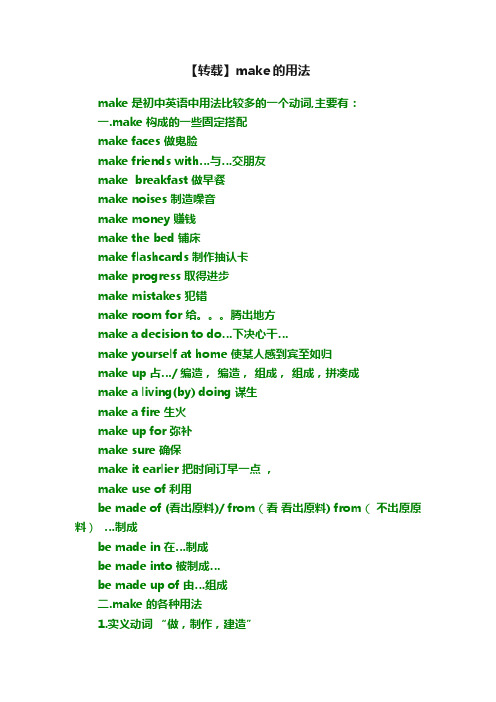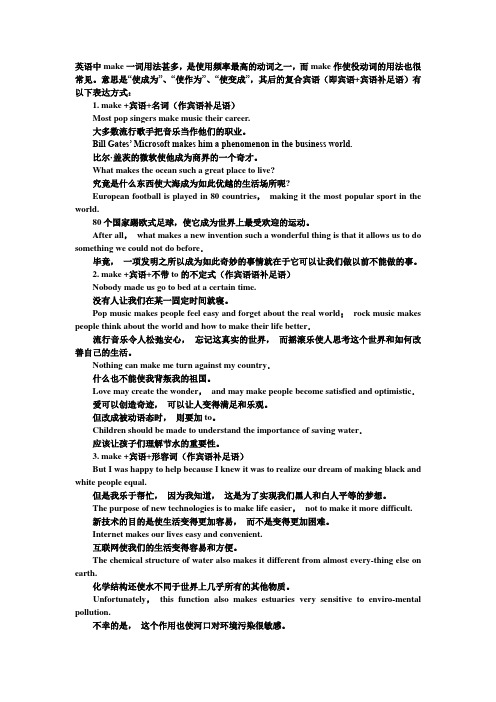make 宾语 宾语补足语(nadjv)
- 格式:doc
- 大小:23.50 KB
- 文档页数:2

【转载】make的用法make 是初中英语中用法比较多的一个动词,主要有:一.make 构成的一些固定搭配make faces 做鬼脸make friends with…与…交朋友make breakfast 做早餐make noises 制造噪音make money 赚钱make the bed 铺床make flashcards 制作抽认卡make progress 取得进步make mistakes 犯错make room for 给。
腾出地方make a decision to do…下决心干…make yourself at home 使某人感到宾至如归make up 占…/ 编造,编造,组成,组成,拼凑成make a living(by) doing 谋生make a fire 生火make up for 弥补make sure 确保make it earlier 把时间订早一点,make use of 利用be made of (看出原料)/ from(看看出原料) from(不出原原料)…制成be made in 在…制成be made into 被制成…be made up of 由…组成二.make 的各种用法1.实义动词“做,制作,建造”make sb sth= make sth for sb (make me a skirt=make a skirt for me)2.使役动词:“使…处于…状态,使成为”结构:make +宾语+宾补(n.,adj.,v.,-ing,-ed)①make 宾语 +n. 意为“使,让某人/某物(成为)…”We made him our monitor. 我们选了他做班长。
② make 宾语 +adj 意为“使,让某人/某事(变得)…”What he did made me unhappy. 他所做的事使我不高兴。
We will make our country more and more beautiful.我们将会使我们的国家越来越美丽。

make用法及短语总结整理介绍make用作使役动词表示“使;使成为” 时,可跟复合结构,关于具体的make的用法有,小编在此整理了make用法及短语相关资料,供大家参阅,希望大家在阅读过程中有所收获!make的用法.1 当make的意思是“做、制造、制作”时,常用的句型是:(1) make sth. (to do sth.) 意为“制造某物”。
例如:She can make kites. 她会制作风筝。
(2) make sb. sth. / make sth. for sb. 意为“为某人制作某物”。
例如: His mother made him a beautiful coat. / His mother madea beautiful coat for him. 他的母亲为他缝制了一件漂亮的外衣。
(3) 被动语态中常用be made of / from, be made in, be made by等短语来表示“……是由……制成的”,“……是在……制成的”和“……是被……制成的”。
例如:Wine is made from grapes. 酒是由葡萄酿制成的。
These cars were made in Changchun. 这些汽车是在长春制造的。
2. 当make的意思是“使、使得”时,一般用于“make + 宾语+ 宾补”这种结构,常用的句型是:(1) make + sb. / sth. + adj. 意为“使某人或某物处于某种状态”。
例如: The news made him happy. 这个消息使他很高兴。
在此句型中,通常用it作形式宾语,而动词不定式或从句才是真正的宾语,而且要后置。

make使动用法总结【导语】以下是作者为大家收集的make使动用法总结(共13篇),欢迎参阅,希望可以帮助到有需要的朋友。
篇1:make使动用法总结make的用法:make的'复合宾语。
英语中make一词用法甚多,是使用频率最高的动词之一,而make作使役动词的用法也很常见。
意思是“使成为”、“使作为”、“使变成”,其后的复合宾语(即宾语+宾语补足语)有以下表达方式:1、make +宾语+名词(作宾语补足语)Most pop singers make music their career.大多数流行歌手把音乐当作他们的职业。
Bill Gates’ Microsoft makes him a phenomenon in the business world.比尔·盖茨的微软使他成为商界的一个奇才。
2、make +宾语+不带to的不定式(作宾语语补足语)Nobody made us go to bed at a certain time.没有人让我们在某一固定时间就寝。
Nothing can make me turn against my country.什么也不能使我背叛我的祖国。
3、make +宾语+形容词(作宾语补足语)But I was happy to help because I knew it was to realize our dream of making black and white people equal.但是我乐于帮忙,因为我知道,这是为了实现我们黑人和白人平等的梦想。
The purpose of new technologies is to make life easier, not to make it more difficult.新技术的目的是使生活变得更加容易,而不是变得更加困难篇2:make的使动用法总结This model was two years in the making.这种型号是用两年时间制成的.。

英语中make一词用法甚多,是使用频率最高的动词之一,而make作使役动词的用法也很常见。
意思是“使成为”、“使作为”、“使变成”,其后的复合宾语(即宾语+宾语补足语)有以下表达方式:1. make +宾语+名词(作宾语补足语)Most pop singers make music their career.大多数流行歌手把音乐当作他们的职业。
Bill Gates’ Microsoft makes him a phenomenon in the business world.比尔·盖茨的微软使他成为商界的一个奇才。
What makes the ocean such a great place to live?究竟是什么东西使大海成为如此优越的生活场所呢?European football is played in 80 countries,making it the most popular sport in the world.80个国家踢欧式足球,使它成为世界上最受欢迎的运动。
After all,what makes a new invention such a wonderful thing is that it allows us to do something we could not do before.毕竟,一项发明之所以成为如此奇妙的事情就在于它可以让我们做以前不能做的事。
2. make +宾语+不带to的不定式(作宾语语补足语)Nobody made us go to bed at a certain time.没有人让我们在某一固定时间就寝。
Pop music makes people feel easy and forget about the real world;rock music makes people think about the world and how to make their life better.流行音乐令人松弛安心,忘记这真实的世界,而摇滚乐使人思考这个世界和如何改善自己的生活。

make句型make句型是英语中最常用的一种句型,它可以表达一种使役的意思。
其结构为“make + 宾语(+ 宾语补足语)”,其中make是动词,而宾语则可以是单词、短语或句子,宾语补足语是可选的。
Make句型的意思是使某人做某事,或者让某物发生某种变化,或者让某物处于某种状态。
例如,“I made her cry.”(我让她哭了。
)在这个句子中,made是动词,her是宾语,cry是宾语补足语,它表示让某人哭泣的意思。
Make句型也可以用来表达对某人的请求或要求,例如“Can you make me a sandwich?”(你能给我做一个三明治吗?)在这个句子中,make是动词,me是宾语,a sandwich是宾语补足语,它表示对某人的请求或要求。
此外,make句型还可以表达使某人做出某种反应的意思,例如“The news made him angry.”(消息让他很生气。
)在这句话里,made是动词,him是宾语,angry是宾语补足语,它表示使某人做出某种反应的意思。
此外,还可以使用make句型来表达让某人做某事的意思,例如“She made him do his homework.”(她让他做作业。
)在这个句子里,made是动词,him是宾语,dohis homework是宾语补足语,它表示让某人做某事的意思。
最后,make句型也可以表达使某物处于某种状态的意思,例如“The rain made the ground wet.”(雨让地面变湿了。
)在这句话里,made是动词,the ground是宾语,wet是宾语补足语,它表示使某物处于某种状态的意思。
总之,make句型是一种最常用的句型,通常用来表达使役的意思,它可以表达让某人或某物做某事、发生某种变化或处于某种状态的意思。

make用法及短语总结整理介绍make用作使役动词表示“使;使成为” 时,可跟复合结构,关于具体的make的用法有,小编在此整理了make用法及短语相关资料,供大家参阅,希望大家在阅读过程中有所收获!make的用法.1 当make的意思是“做、制造、制作”时,常用的句型是:(1) make sth. (to do sth.) 意为“制造某物”。
例如:She can make kites. 她会制作风筝。
(2) make sb. sth. / make sth. for sb. 意为“为某人制作某物”。
例如: His mother made him a beautiful coat. / His mother madea beautiful coat for him. 他的母亲为他缝制了一件漂亮的外衣。
(3) 被动语态中常用be made of / from, be made in, be made by等短语来表示“……是由……制成的”,“……是在……制成的”和“……是被……制成的”。
例如:Wine is made from grapes. 酒是由葡萄酿制成的。
These cars were made in Changchun. 这些汽车是在长春制造的。
2. 当make的意思是“使、使得”时,一般用于“make + 宾语+ 宾补”这种结构,常用的句型是:(1) make + sb. / sth. + adj. 意为“使某人或某物处于某种状态”。
例如: The news made him happy. 这个消息使他很高兴。
在此句型中,通常用it作形式宾语,而动词不定式或从句才是真正的宾语,而且要后置。
例如:Computers make it easier to learn English. 电脑使英语学习更加容易。
当然,除了接形容词作宾补外,还可以接名词、动词的过去分词等作宾补。
例如:They all want to make Jim their monitor. (名词)他们都想让吉姆当班长。
make的用法和短语例句make有做;制造;使得;赚(钱);成功;达成等意思,那么你知道make 的用法吗?下面跟着店铺一起来学习一下,希望对大家的学习有所帮助!make的用法大全:make的用法1:make的基本意思是“做,制造”,即“使甲物变为乙物”“使某物变为某种状态”。
make的用法2:make用作不及物动词时,意思是“开始,试图”“行进,趋向”“被做成,被制成”“增长起来”。
主动形式常含有被动意义。
make的用法3:make用作及物动词时,意思是“制作,做成”“产生,引起”“成为,构成”“获得,赢得,赚得”“走(到),以(某种速度)行进,赶上”“吃”“说明,讲述”。
可接名词、代词作宾语。
make的用法4:make作“作出某种动作”解时,常与某些名词连用,其意思常常近似于与该名词相对应的动词,用来表示行动,可接介词短语,也可接动词不定式。
make的用法5:make可接双宾语,意思是“给…做…,为…提供或准备…”,其间接宾语可以转换为介词for的宾语。
make的用法6:make还可接由名词、形容词、动词不定式、过去分词或介词短语充当补足语的复合宾语。
当名词作宾语补足语时,通常含有“把某种优良品质或地位等赋予对方或自身”的意思,宾语补足语一般含褒义; 当形容词作宾语补足语时,形容词有时可以提至宾语之前; 当动词不定式作宾语补足语时,一般不带to,但在被动结构中to不可省去,在某些谚语中make后的动词不定式是可以带to的; 某些表示“感觉,认识”的动词如understand, know, feel等作宾语补足语时常用过去分词,宾语用反身代词; make后接的复合宾语中,常以it来代替较长的动词不定式短语或从句,即采用形式宾语结构,此时的意思是“使…成为…”“使得”“估计,认为,算出”等。
make的用法7:make偶尔可以用作系动词,意思是“达到某种状态”,表语多为certain, free, light, sure, little, much等形容词或as ifmake的用法8:make可用于被动结构。
使役动词的用法make的用法make用作使役动词表示“使;使成为”时,可跟复合结构,即“make+宾语+宾语补足语”,其中的宾语补足语可以是不带to的不定式、过去分词、形容词或名词。
现将make的复合宾语结构小结如下:一、“make+宾语+n.”意为“使、让某人/某物(成为)……”。
如:XXX.我们推选他作我们足球队队长。
We made him our monitor.我们选他当班长。
二、“make+宾语+adj.”意为“使某人/某事(变得)……”。
如:The news that our team had won made us very happy.我们队赢了的消息使我们大家非常高兴。
We must make the rivers clean.我们必须净化河水。
友情提示:当宾语是不定式短语或从句时,多用it作形式宾语。
如:I made it a n that everybody must be on time.我提出一个条件,人人都要准时。
The heavy rain made it impossible for us to go out.大雨使得我们无法出去。
三、“make+宾语+do XXX.(不带to的不定式)”意为“使或人做某事”。
如: The boy was made to work twelve hours a day.这个男孩被迫每天干十二个小时的活。
四、“make+宾语+V-ed(过去分词作宾补)”这个结构指宾语接受后面的那个动作,表示被动的意思,意为“使某人/某事被……”。
如:The good news made us excited.这个好消息使我们兴奋。
四、“make+宾语+V-ed(曩昔分词作宾补)”这个结构指宾语接受背面的XXX举措,透露表现被动的意义,意为“使或人/某事被……”。
如:The good news made us excited.这个好消息使我们兴奋。
五、“make+宾语+V-ing(目前分词)”这一结构透露表现的意义是“使或人/某事一向在……”。
make的用法中考热点词make用法拾零研究发现,英语中make词义甚多,使用率较高。
中考试题中常常有它的倩影出现。
初中英语make主要用作使役动词,表示“使…变得”和实义动词,表示“做”;“制作”这个基本意思。
下面咱们一起来解密它的主要考点吧!。
一、make用作使役动词,表示“使”;“使…变得”。
其结构为:“make+宾语+宾语补足语”,其中宾语补足语可以是不带to的动词不定式、形容词、名词以及过去分词等。
1.make+宾语+do sth. (即,宾语补足语是省略to的动词不定式)表示“使…(宾语)做某事”。
例如:Our teacher makes us feel more confident. 我们的老师使我们感到更自信。
What makes the grass grow.什么东西使得草生长呢?值得注意的:如果make使用了被动语态,则做宾语补足语的动词不定式中的to不能省略。
(即,be made + to do sth.)例如:The boy was made to work twelve hours a day.这个男孩被迫每天干12小时的活。
Every day I am made to have an egg and some milk. 每天,我不得不吃一个鸡蛋,喝一些牛奶2.make+宾语+adj. 表示“使.....(宾语)变得…”。
例如:I’ll do our best to make you happy. 我将竭尽全力让你感到快乐。
The clerk’s method of dealing with what some think is a boring job made the hours in her day more enjoyable. 这位店员处理他人认为枯燥工作的方法使得她一天数个小时变得更快乐了。
3.make+宾语+n.表示“使…成为…”。
例如:We made him our monitor. 我们选他当我们的班长。
宾语补足语用法宾语补足语是英语教学中的难点,也是高考的热点,更是书面表达中必须具备的一种句型结构。
下面就宾语补足语用法进行以下归纳。
Ⅰ.使役动词后宾语补足语的用法中学教学中最常见的使役动词有:make,have,leave。
他们都表示“使得”,后面都可接宾语+宾语补足语的结构,但用法上有所不同。
一?make用作使役动词表示“使;使成为”时,可跟复合结构,即“make宾+ 语+宾语补足语”,其中的宾语补足语可以是形容词或名词?不带to 的不定式?过去分词。
1.我们推选他为我们足球队队长。
We made him captain of our football team.2.我们队赢了的消息使我们大家非常高兴。
The news that our team had won made us very happy.3.大雨使得我们无法出去。
The heavy rain made it impossible for us to go out.4.奇怪的声音使我们感到恐惧。
The strange noise made us frightened.5.在交通嘈杂声中他无法使自己的声音提高到让别人听到。
He couldn 't make himself heard above the noise of the traffic.6.什么东西使得草生长?What makes the grass grow?注意:过去分词作make 的宾语补足语时,变为被动语态不用加to;但当不定式作其宾补时,变为被动语态一定要加to。
这个男孩被迫每天干十二个小时的活。
The boy was made to work twelve hours a day.选择题:1.Paul doesn 't have to be made _ . He always works hard.A. learnB. to learnC. learnedD. learning2.The result of the entrance exams was not made to the publicuntil lastThursday.A. knowingB. knownC. to knowD. to be known 答案: 1.B2.B二?have 表示“使得⋯⋯”,其后接宾语补足语,常用以下句型:have sb. do sth使. 得某人做某事have sb. doing sth使. 得某人一直做某事have sth. done使得某事被做填空:1.The teacher had her (recite) the text again.2.He wants to have his eyes (examine) tomorrow.3.Be careful,or you 'll have your hands (hurt).4.He had the girl (stand) in the classroom the whole morning.5.He had the walls (paint) this morning.答案: 1.recite 2.examined 3.hurt 4.standing 5.painted 只能用doing 的情况1.表示正在发生Be quick. They have the car waiting for you at the school gate.2.否定句中表示(不能)容忍某人做⋯⋯I won 't have him cheating in the exam.3.表示某一时间内一直延续不断的动作He had us laughing all through the meals.选择?填空题:1.I 've had my radio _ so soon because my father had me _ it.A. ;repairdone B. repaired;do C. repairing;do D. repaired;done2.You can 't have the horse _ all the wasy .t oIto hot. 'A. runB. to runC. runningD. to be runningMrs. Brown was much disappointed to see the washing machine she had had went wrong again.A. itB. it repairedC. repairedD. to be repaired3.We will have you (know) that the machine has been made (work) atfull speed.答案: 1.B 2.C 3.C 4.know,to work 三?leave作使役动词,表示“使/让⋯⋯保持某种状态”。
2
Warming up:
1. Should they be funny, smart, or strong?
funny adj. &fun n.
I heard a funny story.
It's great fun to go sailing.
make fun of=laugh at
2. A good friend is someone who makes me happy.
make+宾语+宾语补足语(n./adj./v.<do/done>)
We made him our leader.
What he said made me angry.
The teacher made us clean the classroom.
=We were made to clean the classroom.
Mr Smith made the workers finish the work within two days.
She spoke loudly in order to make herself heard.
When I first came to England, I can't make myself understood.
一感feel;
二听hear, listen to;
三让let, have, make;
五看see, look at, notice, watch, find;
半帮助help
I saw the boy come in.
The boy was seen to come in.
I often hear him sing the song.
He was often heard to sing the song.
3. Listen to the two friends arguing.
感官动词+doing
I saw him coming in.
I heard him singing the song.
argue with sb. about/over sth
They are arguing with the classmates about the solution to this problem.
the answer to the question
the key to the door
argue againist/for
Some people argue for/againist the idea.
4. What do you think they should do to solve their problem?
think/believe/know
When do you know they will be back?
Which food do you think is healthy?。